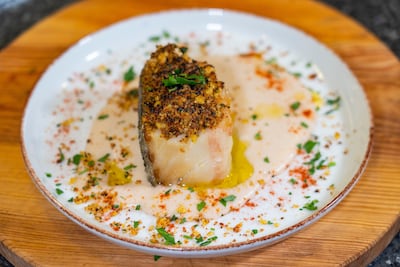From Michelin-starred names and celebrity chefs to experiential cooks and local restaurateurs, Expo 2020 Dubai is a culinary hub like no other. In this series, we profile the chefs invited to be a part of the world's fair and gain a preview of the menu they’ve put together for discerning diners.
LIVE BLOG: Updates and live coverage from Expo 2020 Dubai
The restaurant
Ensconced within the Portuguese pavilion and directly overlooking the main stage is Al Lusitano, a 126-seater restaurant brought to Expo 2020 Dubai by chef Chakall.

Al Lusitano has a set menu for lunch and dinner for €40 ($46).
The team are also flying in their own products, including breads, coffee and spices; and will host tastings of olive oil from different parts of Portugal once a week. “It’s a small country, but the weather is very different from south to north,” says Chakall.
A trademark of the globe-trotting chef – who can speak seven languages, including Arabic – is his replacement of the white hat with brightly coloured turbans (an homage to the time he spent traversing Africa).
The menu

The chef has put together a menu that is simple but authentic, well-plated but not overtly fancy. “My aim is to bring to Expo 2020 Dubai a real experience of the food served in Portugal. And my expectation is that people coming from Portugal should be able to say they got a taste of home,” he tells The National.
Al Lusitano will serve dishes such as cod fish dumplings, chicken piri piri, chickpeas puree, roasted lamb, beef and tempura (“tempura, which comes from the word tempora, is originally from Portugal, not Japan,” says Chakall), plus pasteis de nata (egg custard tart pastries), leite de creme (a kind of sweet rice creme brulee), chestnut pudding and dona amelia (a pudding from the Azores islands, made up with spices such as nutmeg and cinnamon).
“Flavour is the end game. I grew up with real food, and I like to eat – and serve – real food; it has more heart. I always eat at home what I make in my restaurants, and focus on a product-based cuisine,” says Chakall.
The chef
The fifth of six siblings, Chakall was born in Argentina, but is a Portuguese citizen by choice. His parents come from Galician, Swiss-German, Basque-French, Italian and indigenous northern Argentinian origins; three of his four grandparents were in the food business, and Chakall says he grew up working in his mum’s restaurant.
“I grew up in a restaurant, which is the best education you can ever have. We served 400 meals in a factory, and only 100 over the weekends so, for me now, cooking for 10 or 20 people is not scary at all.”
A journalism degree and career could not put off what “was inside me”, says the chef. “I was fighting the feeling, I did not want to become a chef, but destiny was stronger than me."
Chakall helms the catering company Cozinha Divina in Portugal, plus several restaurant concepts, such as El Bulo Social Club, Refeitorio Senhor Abel, L'Origine, Areal Beach Bar and Luz by Chakall in Lisbon, and the Chakburger franchise.
He is also the executive chef of three restaurants at The Prime Energize Monte Gordo in Portugal, Super Bock in China and Roca Sundy in Sao Tome and Principe, and has authored a number of cookbooks, including Portugal Revisitado, and appeared on television shows such as Chakall & Pulga.
The chef describes his cooking style as uncomplicated, unpretentious and stress-free. “I always cook in contrast,” he says, “because when I eat a dish, I am most happy when it surprises my palate. Of all the restaurants I’ve eaten at in Dubai so far, a simple leek soup at Mythos in JLT stands out just for how different its smoky flavour is. I will remember it all my life.”


